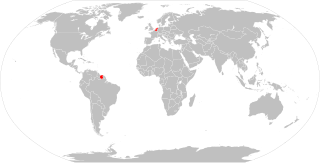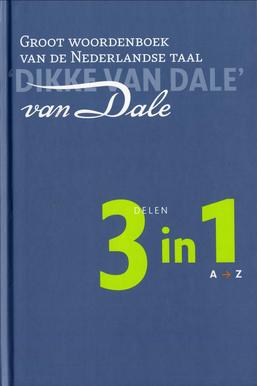
The Dutch Language Union is an international regulatory institution that governs issues regarding the Dutch language. It is best known for its spelling reforms which are promulgated by member states, grammar books, the Green Booklet and its support of Dutch language courses and studies worldwide. It was founded on a treaty concluded between the Netherlands and Belgium on 9 September 1980. Suriname has been an associate member of the Taalunie since 2004.

Greater Netherlands is an irredentist concept which unites the Netherlands, Flanders, and sometimes Brussels. Additionally, a Greater Netherlands state may include the annexation of the French Westhoek, Suriname, formerly Dutch-speaking areas of Germany and France, or even the ethnically Dutch and/or Afrikaans-speaking parts of South Africa. A related proposal is the Pan-Netherlands concept, which includes Wallonia and potentially also Luxembourg.

IJ is a digraph of the letters i and j. Occurring in the Dutch language, it is sometimes considered a ligature, or a letter in itself. In most fonts that have a separate character for ij, the two composing parts are not connected but are separate glyphs, which are sometimes slightly kerned.

The Flemish Region, usually simply referred to as Flanders, is one of the three regions of Belgium—alongside the Walloon Region and the Brussels-Capital Region. Covering the northern portion of the country, the Flemish Region is primarily Dutch-speaking. With an area of 13,626 km2 (5,261 sq mi), it accounts for only 45% of Belgium's territory, but 58% of its population. It is one of the most densely populated regions of Europe with around 500/km2 (1,300/sq mi).

East Flemish is a collective term for the two easternmost subdivisions of the so-called Flemish dialects, native to the southwest of the Dutch language area, which also include West Flemish. Their position between West Flemish and Brabantian has caused East Flemish dialects to be grouped with the latter as well. They are spoken mainly in the province of East Flanders and a narrow strip in the southeast of West Flanders in Belgium and eastern Zeelandic Flanders in the Netherlands. Even though the dialects of the Dender area are often discussed together with the East Flemish dialects because of their location, the latter are actually South Brabantian.
The Woordenboek der Nederlandsche Taal is a dictionary of the Dutch language. It contains between 350,000 and 400,000 entries describing Dutch words from 1500 to 1976. The paper edition consists of 43 volumes on 49,255 pages. It is believed to be the largest dictionary in the world in number of pages. The dictionary was nearly 150 years in the making from 1849; the first volume was published in 1864, and the final volume was presented to Albert II of Belgium and Beatrix of the Netherlands in 1998.

DPG Media Group is a Belgian media group. It is active in Belgium, the Netherlands, and Denmark. The exact ownership structure is not clear; it is believed that the group is mainly owned by the Belgian Van Thillo family. The company employs about 6,000 people.

The Word list of the Dutch language is a spelling dictionary of the Dutch language. It is officially established by the Dutch Language Union. Because of the colour of its published form, it is better known as the Green Booklet.
Witte Boekje is the popular name for the Spelling Guide of Our Language, a publication of the Genootschap Onze Taal. The first edition was released in October 1998; the latest edition is the tenth and was released in 2004. All these publications are explanations of the official spelling rules, as set by the Dutch Language Union.
The history of Dutch orthography covers the changes in spelling of Dutch both in the Netherlands itself and in the Dutch-speaking region of Flanders in Belgium. Up until the 18th century there was no standardization of grammar or spelling. The Latin alphabet had been used from the beginning and it was not easy to make a distinction between long and short vowels (a / aa). The word jaar (year) for instance, could be spelt jar,jaer,jair, or even yaer and iaer. With the spirit of the French Revolution, attempts were made to unify Dutch spelling and grammar. Matthijs Siegenbeek, professor at Leiden was officially asked in 1801 to draw up a uniform spelling.

Dutch is a West Germanic language, spoken by about 25 million people as a first language and 5 million as a second language and is the third most spoken Germanic language. In Europe, Dutch is the native language of most of the population of the Netherlands and Flanders. Dutch was one of the official languages of South Africa until 1925, when it was replaced by Afrikaans, a separate but partially mutually intelligible daughter language of Dutch. Afrikaans, depending on the definition used, may be considered a sister language, spoken, to some degree, by at least 16 million people, mainly in South Africa and Namibia, and evolving from Cape Dutch dialects.

Van Dale Great Dictionary of the Dutch Language, called Dikke Van Dale for short, is the leading dictionary of the Dutch language. The latest edition was published in April 2022.

Flemish (Vlaams) is a Low Franconian dialect cluster of the Dutch language. It is sometimes referred to as Flemish Dutch, Belgian Dutch, or Southern Dutch. Flemish is native to the region known as Flanders in northern Belgium; it is spoken by Flemings, the dominant ethnic group of the region. Outside of Belgium Flanders, it is also spoken to some extent in French Flanders and the Dutch Zeelandic Flanders.

The Royal Flemish Academy for Dutch Language and Literature is an institution focused on the study and promotion of the Dutch language in Flanders. It is the Dutch-speaking counterpart of the Académie royale de langue et de littérature françaises de Belgique and one of Belgium's numerous academies.

Gerrit Kouwenaar was a Dutch journalist, translator, poet and prose writer.

Johan Hendrik van Dale was a Dutch teacher, archivist, and lexicographer. He created Van Dale's Great Dictionary of the Dutch Language ; first published in 1874, after his death. It was, and in its subsequent editions remains, the leading dictionary of the Dutch language.

Philip Freriks is a Dutch journalist, columnist and television presenter.

Bart Chabot is a Dutch writer and poet.

Pan-Netherlands, sometimes translated as Whole-Netherlands, is an irredentist concept which aims to unite the Low Countries into a single state. It is an example of Pan-Nationalism.
















